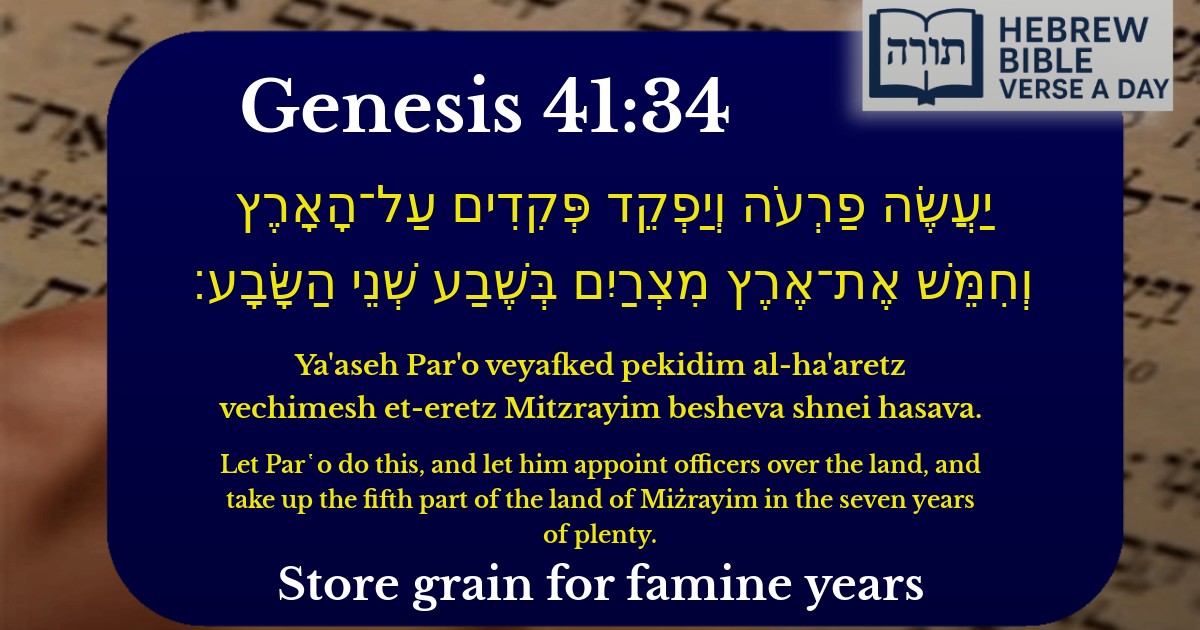Join Our Newsletter To Be Informed When New Videos Are Posted
Join the thousands of fellow Studends who rely on our videos to learn how to read the bible in Hebrew for free!
Hebrew Text
יַעֲשֶׂה פַרְעֹה וְיַפְקֵד פְּקִדִים עַל־הָאָרֶץ וְחִמֵּשׁ אֶת־אֶרֶץ מִצְרַיִם בְּשֶׁבַע שְׁנֵי הַשָּׂבָע׃
English Translation
Let Par῾o do this, and let him appoint officers over the land, and take up the fifth part of the land of Miżrayim in the seven years of plenty.
Transliteration
Ya'aseh Par'o veyafked pekidim al-ha'aretz vechimesh et-eretz Mitzrayim besheva shnei hasava.
Hebrew Leining Text
יַעֲשֶׂ֣ה פַרְעֹ֔ה וְיַפְקֵ֥ד פְּקִדִ֖ים עַל־הָאָ֑רֶץ וְחִמֵּשׁ֙ אֶת־אֶ֣רֶץ מִצְרַ֔יִם בְּשֶׁ֖בַע שְׁנֵ֥י הַשָּׂבָֽע׃
יַעֲשֶׂ֣ה פַרְעֹ֔ה וְיַפְקֵ֥ד פְּקִדִ֖ים עַל־הָאָ֑רֶץ וְחִמֵּשׁ֙ אֶת־אֶ֣רֶץ מִצְרַ֔יִם בְּשֶׁ֖בַע שְׁנֵ֥י הַשָּׂבָֽע׃
🎵 Listen to leining
Parasha Commentary
📚 Talmud Citations
This verse is not quoted in the Talmud.


Context of the Verse
This verse (Bereshit 41:34) is part of Yosef's interpretation of Pharaoh's dream and his subsequent advice on how to prepare for the upcoming seven years of famine. Yosef suggests that Pharaoh appoint overseers to collect and store grain during the years of plenty to sustain Egypt during the years of scarcity.
Rashi's Commentary
Rashi explains that the phrase "וְחִמֵּשׁ אֶת־אֶרֶץ מִצְרַיִם" ("take up the fifth part of the land of Egypt") means that the officers should collect one-fifth of the produce during the years of plenty. This is based on the root חמש, which denotes a fifth. Rashi further notes that this measure was appropriate to ensure sufficient reserves without overburdening the people.
Rambam's Perspective
Rambam (Hilchot Matnot Aniyim 6:3) draws a halachic principle from this verse, stating that setting aside a portion of produce during times of plenty is a model of prudent governance and foresight. He emphasizes that this approach aligns with the Torah's values of preparing for future needs and avoiding waste.
Midrashic Insights
Practical Implications
The verse teaches the importance of: